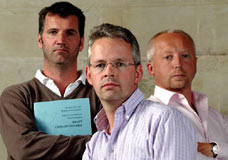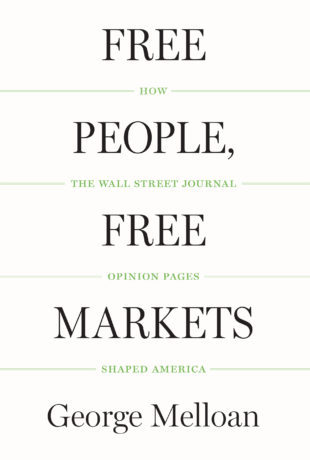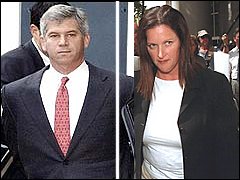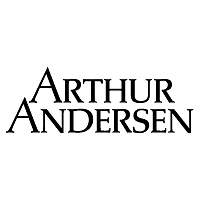
 The Sihpol acquittal yesterday focuses attention on an important aspect of the current wave of criminalizing merely questionable business transactions — that is, the government’s destruction of good reputations in its quest to obtain convictions and prevent juries from hearing testimony that is favorable to unpopular defendants.
The Sihpol acquittal yesterday focuses attention on an important aspect of the current wave of criminalizing merely questionable business transactions — that is, the government’s destruction of good reputations in its quest to obtain convictions and prevent juries from hearing testimony that is favorable to unpopular defendants.
In this excellent Chicago Tribune op-ed (free registration req.), David Hall — a former editor of the Cleveland Plain Dealer and Denver Post who covered Arthur Andersen as a Chicago reporter in the 1960s — decries the cultural climate and the lack of prosecutorial discretion that led to the destruction of Andersen:
Andersen’s head on the U.S. Justice Department’s dish, with unjust charges regarding Enron Corp. and the connivance of a slow-witted judge, is a parallel in today’s political-legal-news culture–blame quickly, accuse broadly and dare the accused to defend. Bloody heads on plates satisfy the evening news and pundits looking for the easy prey of righteousness.
The Justice Department, eager to demonstrate its conservative stance would not be cowed by big business, maliciously destroyed a fine American company, a contributor to orderly commerce for eight decades. Andersen stumbled amid the stampede of cliffside accounting in the ’90s, particularly regarding Sunbeam Corp. and Waste Management, but nothing deserved a judicial death sentence. . .
Many institutions, private and public, must feel under such siege, must fear the plow and the salt and the unjust destruction of Andersen. Every good-faith act should not be turned into an inquisition–by politicians polishing campaign ads, prosecutors primping for the boss, or reporters intent on bringing the first head on a dish.
Meanwhile, as the defense in the ongoing Enron Broadband trial proceeds with putting on their case, an interesting development is taking place. As the Chronicle’s Mary Flood reports, Lawrence Ciscon, a former Enron Broadband systems engineer, is testifying on behalf of his five former Enron Broadband colleagues despite the fact that prosecutors have told him that he is a target of the Enron criminal investigation and could be indicted himself.
Mr. Ciscon’s decision to testify brings into focus an abominable governmental tactic that ensures that the jury will never hear much of the favorable testimony for the defense. In both the Enron Broadband case and the earlier Nigerian Barge case, the prosecutors have identified dozens of former Enron executives as either targets of the Enron criminal investigation of unindicted co-conspirators of the defendants. As a result, the government has effectively prevented many witnesses with favorable testimony for the defendants in both the Broadband and Nigerian Barge cases from testifying because those witnesses would waive their Fifth Amendment privilege and probably face further perjury charges if they chose to tesfify contrary to the government’s position in those cases. Indeed, in the case against former Enron CEO Jeff Skilling, former Enron chairman Kenneth Lay, and former Enron chief accountant Richard Causey, the Enron Task force has identified 114 unindicted conspirators in an effort to chill as much favorable testimony for the defendants as possible.
Thus, the “Justice” Department is not really interested in “justice” at all, or even in having a jury fairly evaluate all evidence relating to its charges against unpopular business figures. Rather, our “Justice” Department is much more interested in indulging public bias against unpopular businessmen, regardless of the reputations of citizens that it destroys in the process. Something is seriously wrong with the administration of justice in America when it takes the uncommon courage of someone such as Lawrence Ciscon for a jury to hear favorable testimony for businessmen who are facing their government’s overwhelming power to imprison them for most of the rest of their lives.








 The Chronicle’s Mary Flood reports that Lea Fastow — who served a longer sentence under harsher conditions because of her marriage to former Enron CFO Andrew Fastow —
The Chronicle’s Mary Flood reports that Lea Fastow — who served a longer sentence under harsher conditions because of her marriage to former Enron CFO Andrew Fastow —  Ellen Podgor
Ellen Podgor